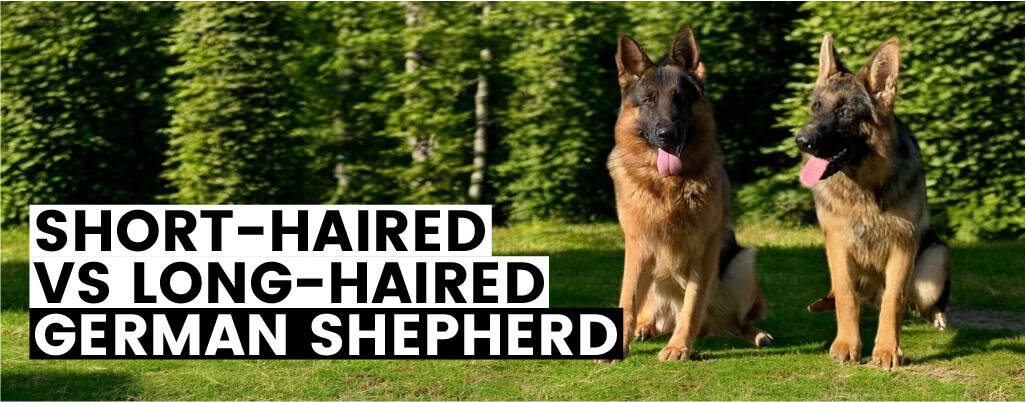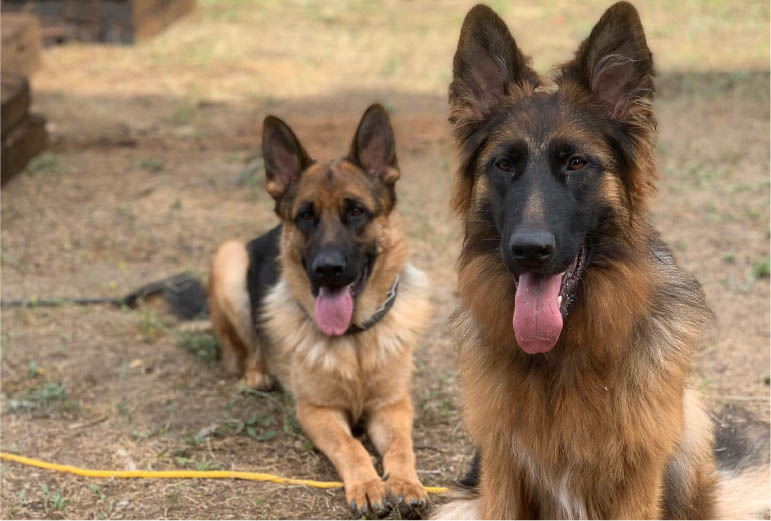
Kempkes Executive K9
German Shepherds are widely loved for their unique looks and strong presence. One of their most defining features is their coat, which can be short or long. Each coat type has its charm and requires different care. Our extensive experience with these remarkable dogs has given us a unique insight into the distinct qualities of both short-haired and long-haired varieties.
At Kempkes Executive K9s, we want to help you find the German Shepherd that fits your lifestyle. While they share many defining traits, these two types have differences in appearance, grooming needs, temperament, and suitability for various climates and activities.
This post will explore the short-haired vs long-haired German Shepherds to understand better which type suits you and your home best.
SUMMARY
- Long-haired Shepherds fare better in cold weather, while short-haired ones need extra cold protection.
- Long-haired Shepherds require more frequent brushing to prevent matting, while short-haired types are easier to maintain.
- Both types need ample exercise, but short-haired Shepherds may thrive more in high-energy households.
- Your climate, activity level, and grooming preference should guide your choice between these two coat types.
Short-Haired and Long-Haired German Shepherds in a Quick Glance
This table helps you quickly decide between two German shepherds of your choice.
| Aspect | Short-Haired German Shepherd | Long-Haired German Shepherd |
|---|---|---|
| Coat Length | 1-2 inches, dense double coat | 2+ inches often lacks an undercoat |
| Grooming Needs | Moderate – weekly brushing | High – frequent brushing to prevent matting |
| Weather Resistance | Excellent due to the double coat | Moderate, may need extra protection in cold |
| Appearance | Sleek and athletic | Fluffier, often with a luxurious look |
| Common Use | Fluffier, often with a luxurious look | Companion dogs, less common in working roles |
| Shedding | Moderate to high, especially seasonally | High, especially during seasonal changes |
Differences Between Short-Haired and Long-Haired German Shepherds

Kempkes Executive K9
The hair length of this breed is due to phenotype, which is why dogs have long and short hair. Explore other characteristics that make short-haired GSDs different from long-haired GSDs.
1. Family Suitability and Interaction with Children
Both short-haired and long-haired German Shepherds make excellent family pets. However, long-haired German Shepherds are often described as having a softer, more patient demeanor, which can be a bonus for families with young children. They exhibit a nurturing attitude, making them especially good with kids.
Short-haired German Shepherds, while also great with families, may have a slightly more energetic and assertive temperament, ideal for households with older children or active family lifestyles. This fine distinction in demeanor helps families determine which type is the best fit.
CALL Michael and Jeannette Today!
Your Loyal German Shepherd is Just a Call Away – Purebred and Ready for Your Family!

2. Coat Length and Texture
The primary difference between short-haired and long-haired German Shepherds is their coat length and texture.
Short-haired German Shepherds have a double coat, where the outer layer is slightly shorter, dense, and close to the skin. This coat protects against weather elements, dirt, and even minor scrapes, making it practical for working dogs.
In contrast, long-haired German Shepherds have longer, softer fur, often without a double layer, giving them a less weather-resistant coat.
3. Shedding Patterns and Grooming Needs
Both short-haired and long-haired German Shepherds are known to shed, especially during seasonal changes.
Short-haired German Shepherds shed slightly less and are easier to groom, needing weekly brushing to maintain a clean and healthy coat. More frequent brushing can help manage the extra hair during peak shedding seasons in spring and fall.
Long-haired German Shepherds require more intensive grooming to avoid tangling and matting, especially if they have an undercoat. Their coats need brushing several times a week to stay healthy, which is something to consider if you’re looking for a lower-maintenance pet.
4. Training and Socialization Requirements
Training and socialization are essential for both short-haired and long-haired German Shepherds, as these intelligent dogs thrive with structure and mental engagement. Early socialization helps them develop confidence, easing interactions with people, other pets, and new environments.
Basic obedience training should begin as early as possible to build a strong foundation, with reinforcement in positive behavior and discipline. Both types of German Shepherds excel in advanced training, making them ideal candidates for agility, protection work, or therapy roles.
Regular training sessions and social outings can ensure they grow into well-adjusted, loyal companions comfortable in diverse situations.
CALL Michael and Jeannette Today!
Train with the Best – Elite German Shepherd Schutzhund/IPO Training in Los Angeles!

5. Temperament and Personality Traits
Many long-haired German Shepherd owners report that these dogs are generally calm, gentle, and affectionate, making them ideal for families and those seeking a more laid-back companion.
On the other hand, short-haired Shepherds are often seen as slightly more assertive and alert, which aligns with their traditional roles in protection and working environments.
While both types are highly trainable, loyal, and intelligent, the long-haired variety may exhibit a softer demeanor, whereas the short-haired version may show heightened alertness and drive. This difference can influence which type best matches your household dynamics.
6. Suitability for Working Roles
Short-haired German Shepherds work well in police, military, and search-and-rescue jobs. Their manageable coat allows them to focus on tasks without extensive grooming, making them ideal for physically demanding roles.
Long-haired German Shepherds still perform these jobs but are less commonly seen in such roles. Instead, they excel in settings where a gentler temperament is valued, such as therapy or companionship roles. This suitability for different work environments is worth considering, especially if you seek a partner for specific tasks.
7. Energy Levels and Exercise Needs
While both types of German Shepherds are energetic and require regular exercise, short-haired German Shepherds are often seen as having a slightly higher drive. They may be more inclined towards intense activities, such as agility training, running, or fieldwork, making them a good match for highly active owners.
Though equally active, long-haired German Shepherds relaxed in demeanor, enjoying moderate activity and family-oriented exercise routines. This subtle difference in energy levels can be essential for families or individuals who prefer a high-intensity exercise partner or a more laid-back companion.
Long vs Short-Haired GSDs: Which is Right for You?
Both short-haired and long-haired German Shepherds bring unique qualities. Choosing the right one for your lifestyle involves understanding and aligning these differences with your needs.
Short-haired German Shepherds with double coats tend to fare better if you live in a warmer climate.
Long-haired German Shepherds are more comfortable in colder climates, provided they can access shaded, more excellent areas.
When it comes to working roles, short-haired Shepherds are the go-to choice for intense, physical jobs like police or service work due to their easy maintenance. Long-haired Shepherds, meanwhile, shine in therapy or companionship roles, where their calm demeanor is highly valued.
Ultimately, either type makes a beautiful, loyal addition to the right home.
FAQs
Which of the Two is Better for the Show?
Long-haired German Shepherds are often preferred in show rings due to their striking, luxurious coats and distinctive appearance, which can stand out in confirmation events. However, this depends on the show’s standards. In some competitions, short-haired German Shepherds are favored for their traditional look, adhering closely to working-dog characteristics many breed organizations value.
Is There a Difference in the Price of Long and Short-Haired GSD?
Yes, there can be a price difference between long-haired and short-haired German Shepherds. Long-haired varieties may be slightly more expensive due to their rarity and popularity in some regions. However, pricing is also influenced by factors like breeder reputation, lineage, and overall demand, so costs vary widely regardless of coat length.
Do long-haired German Shepherds have a higher risk of ear infections?
Long-haired German Shepherds can be more prone to ear infections due to their longer ear fur, which can trap moisture and debris. Regular cleaning and inspections of their ears are essential to prevent infections.
Are short-haired German Shepherds hypoallergenic?
Short-haired German Shepherds are not hypoallergenic. They still shed dander and fur, triggering allergies in sensitive individuals. Regular grooming and cleaning can help minimize allergens in the home.






